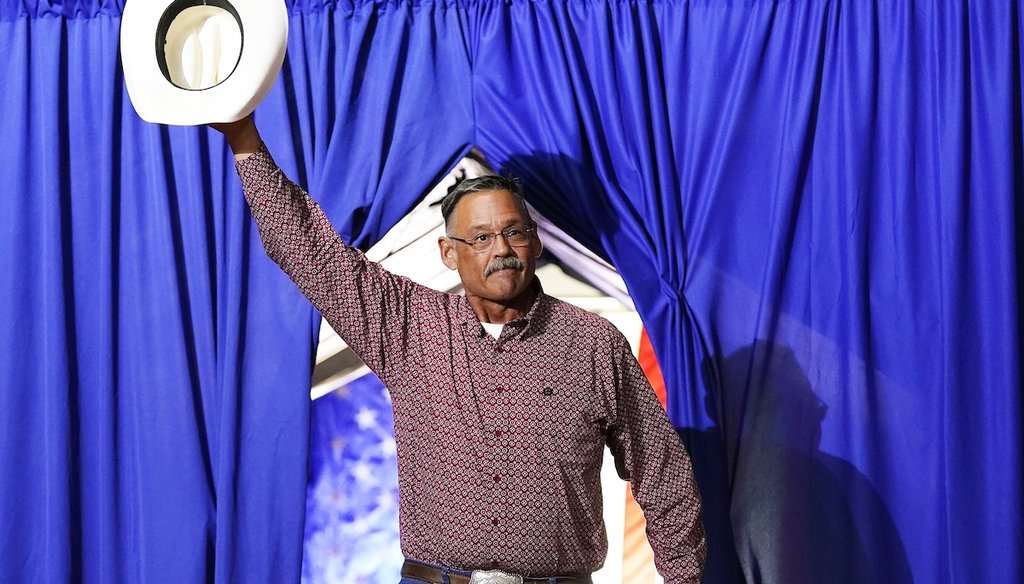Stand up for the facts!
Our only agenda is to publish the truth so you can be an informed participant in democracy.
We need your help.
I would like to contribute

Mark Finchem, a Republican candidate for Arizona Secretary of State, waves to the crowd as he arrives to speak at a Save America rally July 22, 2022. (AP)
Arizona Republican secretary of state candidate wrong about ‘fake’ mail ballots
If Your Time is short
-
Finchem, an Arizona secretary of state candidate, wants to eliminate expansive voting by mail. The state has allowed voting by mail for decades without an excuse. The majority of voters in both parties vote that way.
-
In Arizona, voters who want to receive a mail ballot for a specific election or on a continuing basis must opt in.
Republican Mark Finchem is running for the job of Arizona’s top elections official while vowing to largely ditch the most popular way of casting a ballot: by mail.
Finchem said he favored West Virginia’s approach to mailing ballots, which requires voters to request to receive their ballots by mail in advance.
"I am a fan of the West Virginia model, which is absentee ballots opt-in," Finchem said in an Aug. 25 radio interview. "In Arizona, we have flood the zone with fake ballots."
Finchem didn’t explain his definition of "fake ballots" or respond to our email seeking his evidence. But his claim leaves the misleading impression that Arizonans have received ballots they didn’t request. That’s wrong.
Arizona is not one of the states that sends all voters a mail ballot. Voters must "opt in" to receive a mail ballot for a specific election or on a continuing basis.
Sign up for PolitiFact texts
Finchem is part of a national coalition of candidates seeking to upend common voting practices while denying the reality that Joe Biden won the presidency in 2020. Finchem has supported a series of anti-democratic proposals, such as giving the state Legislature the power to accept or reject election results.
In November, Finchem will face Democrat Adrian Fontes, former Maricopa County Recorder.
Voting by mail has been popular in Arizona for decades
Voting by mail has existed in Arizona for more than a century, and it is used by both major parties.
In 1991, the state established a law to allow any voter to cast a ballot by mail without an excuse, such as being sick or out of town. It grew so popular that county officials persuaded the state in 2007 to create a permanent early voting list so that voters could sign up to get a mail ballot for each election.
In 2021, the state Legislature passed a law to make it easier to remove voters from that list. Starting in 2027, if voters don’t vote by mail in at least one election within two consecutive election cycles, they will be removed from the active early voting list.
Ballots received early make up between 70% to 80% of ballots cast in Arizona, said Paul Bentz, who does public opinion surveys at HighGround, a Phoenix consulting company.
"Certainly, there were portions of Republicans who changed their behavior and chose to drop off their ballot on Election Day or vote in person at a polling place, but a vast majority of Republicans still chose to vote early and will continue to do so in the general election," Bentz said.
That applies to Finchem’s supporters, too. During the primary, about three of every four voters who cast a ballot for Finchem did so early, which is mostly by mail.
Voters in West Virginia must have an excuse to vote absentee, such as being out of town or confined for medical reasons.
Nearly half of voters in West Virginia cast an absentee ballot in the 2020 primary, amid COVID-19. But usually less than 3% vote this way, said Mike Queen, a spokesperson for the West Virginia secretary of state.
Election experts dispute the idea of ‘fake ballots’
Arizona may have a more permissive mail voting law, but Finchem is wrong to suggest that it is not an "opt in" state. Voters either sign up for the active list to regularly get mail ballots or for a mail ballot for a specific election.
In Maricopa County, the state’s most populous county, voters can request a one-time mail ballot by phone or mail. For the active early voting list, voters sign up online or download the form and submit it in person.
Every current elected official in Arizona has been elected primarily by mail ballots, said Alex Gulotta, Arizona state director of All Voting is Local, a voting rights group.
There is no nefarious or illegal "flooding" of the zone.
The form to request a mail ballot requires voters to provide multiple pieces of identifying information including their name, address, birth date, and driver's license or last four digits of their Social Security number. By collecting that information, county officials can verify that the ballot request is legitimate.
Featured Fact-check
Voting by mail is popular in Arizona for a few reasons, said Pinny Sheoran, president of the League of Women Voters of Arizona. The weather is hot in Arizona, so some voters spend part of the year in another state (and wouldn’t be in town for the primary election, usually held in August). Other voters don’t want to miss work. Some voters find it more convenient to vote from home, where they can research the candidates leisurely with the ballot in hand.
If Finchem’s comment about "fake ballots" is interpreted to mean a counterfeit ballot, that is also nonsense.
A ballot will not be counted if it is fake. Election officials verify signatures on mail ballot envelopes before counting them, another security step.
"The mail system does not permit false votes to be counted because the signature won't match the registered voter's signature," said Paul Bender, an Arizona State University law professor.
Voters can sign up for free alerts from county election officials to ensure their ballot is safe and counted. In Maricopa, voters get texts when their ballot is on the way to them. Once voters mail in their ballot, they get texts telling them when it is received and counted. Voters are also alerted if there is a problem, such as a missing or mismatched signature.
Our ruling
Finchem said, "In Arizona, we have flood the zone with fake ballots."
Although he did not explain his definition of "fake ballots," Finchem’s description suggests that ballots are mailed out en masse to voters that did not request them. But that’s now how it works — and there’s no evidence of pervasive fraud or fakery.
Arizona voters must take steps to receive a mail ballot, whether it’s for a specific election or a continuing basis.
Finchem’s statement is an inaccurate and ridiculous summation that could discourage voter participation in a legitimate process. We rate this claim Pants on Fire!
RELATED: Why the ‘stop the steal’ Arizona Republicans are wrong about 2020
RELATED: No proof for pro-Trump conspiracy theory of secret watermarks on Ariz. ballots
RELATED: All of our fact-checks about Arizona
Our Sources
John Fredericks radio show, Interview with March Finchem, Aug. 25, 2022
Maricopa County Elections, Early ballot request, Accessed Aug. 30, 2022
Arizona Secretary of state, Ballot by mail and active early voting request form, Accessed Aug. 30, 2022
Arizona Secretary of State, Election results, Aug. 2, 2022
West Virginia Secretary of State, Absentee ballot voting, Accessed Aug. 24, 2022
West Virginia Secretary of State, Absentee voting eligibility summary, May 2, 2022
PolitiFact, Voting by mail has been popular in Arizona for decades. Now the state GOP wants to ban it, March 17, 2022
Telephone interview, Mike Queen, West Virginia Secretary of State spokesperson, Aug. 29, 2022
Telephone interview, Pinny Sheoran, League of Women Voters of Arizona president, Aug. 29, 2022
Email interview, Paul Bentz, Senior Vice President ‐ Research & Strategy at HighGround Inc. consulting firm, Aug. 29, 2022
Email interview, Paul Bender, professor of law and dean emeritus for the Sandra Day O'Connor College of Law, Aug. 29, 2022
Email interview, Taylor Moss, election protection director at Election Protection Arizona, Aug. 29, 2022
Telephone, Alex Gulotta, Arizona state director of All Voting is Local, Aug. 29, 2022
Browse the Truth-O-Meter
More by Amy Sherman
Arizona Republican secretary of state candidate wrong about ‘fake’ mail ballots
Support independent fact-checking.
Become a member!
In a world of wild talk and fake news, help us stand up for the facts.












































